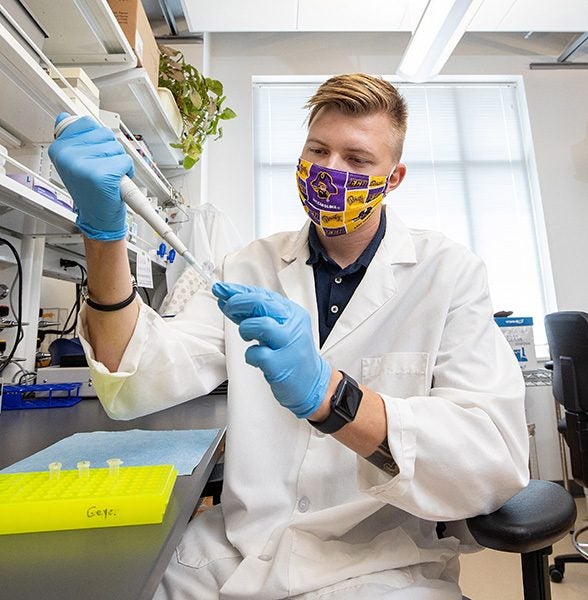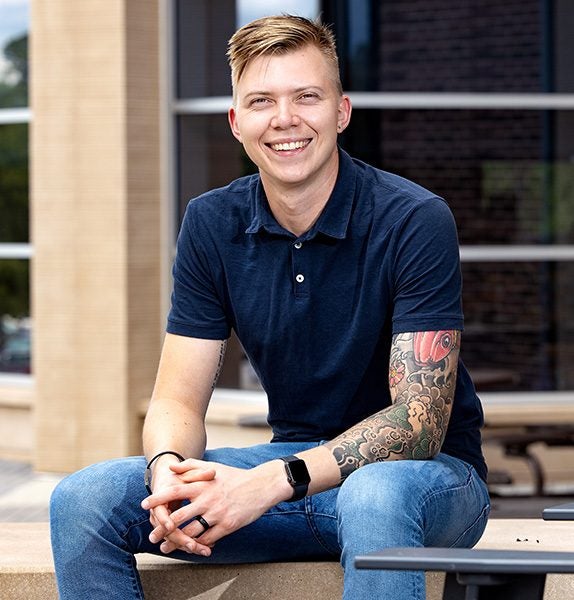Brody PhD student earns fellowship to study male contraceptive drug targets
A PhD student in the Brody School of Medicine has earned a highly competitive fellowship from the Male Contraceptive Initiative (MCI), supporting his efforts to identify potential male contraceptive drug targets.
Oleksandr “Sasha” Kirsanov, a PhD candidate in the laboratory of Dr. Chris Geyer, an associate professor in Brody’s Department of Anatomy and Cell Biology, was awarded $50,000 per year for two years to identify molecular targets that can be further used to design safe, non-hormonal, reversible male contraceptive drugs.

Oleksandr “Sasha” Kirsanov, a PhD student in the Brody School of Medicine, has earned a fellowship from the Male Contraceptive Initiative for his research to identify potential male contraceptive drug targets. (Photos by Rhett Butler)
“I was ecstatic,” Kirsanov said of earning the fellowship. “This is an incredible personal career-development opportunity, and this funding will certainly help our lab.”
Geyer said the fellowship is a testament to Kirsanov and other students of his caliber.
“We do our best to prepare our graduate students for whatever future career they desire, whether it be in academia as a teacher or researcher, in private industry, or at a government agency,” Geyer said. “In many ways, this fellowship is reflective of the high quality of graduate students we have here at Brody; as a mentor, our job is pretty simple when we have intelligent and motivated students like Sasha to work with.”
Kirsanov, a native of Simferopol, Ukraine, earned a tennis scholarship to Chowan University, where he graduated with a BS in biology with an allied health concentration.
He joined the Geyer lab in 2016 as a Master’s student and was amazed at how the lack of knowledge and information on the differentiation process in male germ cells could have such a significant impact on society.
“As of today, male contraceptives are still limited to condoms and vasectomy, both of which are far from being optimal,” Kirsanov said. “Therefore, family planning continues to primarily be the responsibility of women, even though a large number of men would welcome the opportunity to use male contraceptive methods. Being able to assist in developing a solution to this problem is one of the reasons this research is important to me.”
Historically, male contraception development lags behind that of women. Oral birth control pills were approved by the FDA in 1960, but still today, condoms remain the only option for reversibly controlling the male side of the equation, Geyer said, adding that the development of a male contraceptive drug will help reduce unwanted pregnancies and lessen the burden on women, many of whom cannot tolerate hormone-based birth control pills.
“With the world’s population slated to reach 10 billion over the next few decades, both men and women need to participate in reducing overpopulation,” he added. “So, the NIH has pushed more grant funding towards research aimed at identifying molecular targets in developing male germ cells as well as in sperm, for the creation of male contraceptive drugs.

Kirsanov said the fellowship opens doors for him to hone his research skills, and that the dual support system will help him proceed with confidence.
“In addition, there are non-profits like MCI who are participating in this effort by educating and funding scientists like Sasha as well as research projects, particularly promising ones in early stages of their development.”
Kirsanov said the fellowship opens doors for him to hone his research skills, and that the dual support system will help him proceed with confidence.
“Dr. Geyer is a phenomenal mentor; he has been very supportive of experiments and ideas outlined in the proposal and also guided me through my Master’s and PhD work and he has taught me a lot, and I have much more to learn from him,” Kirsanov said. “Male Contraceptive Initiative gives their researchers total freedom of ideas and experiments, so we did not have to change methodology at all.”
He also said his educational experience at Brody has contributed to his success so far.
“Brody has been very supportive, and their values have always been of the highest standards,” he said. “I would not be where I am now without all the help Brody has provided over the years.”
Male Contraceptive Initiative was founded in 2014 in Durham, N.C. as a global hub for researchers, philanthropists and advocates in search of ways to advance the development of novel safe, non‑hormonal, reversible male contraceptives.
MCI’s mission is to facilitate research and development of male contraceptives for people around the world and to build awareness among researchers, donors and the general public about the demand for and status of novel male contraceptive methods.